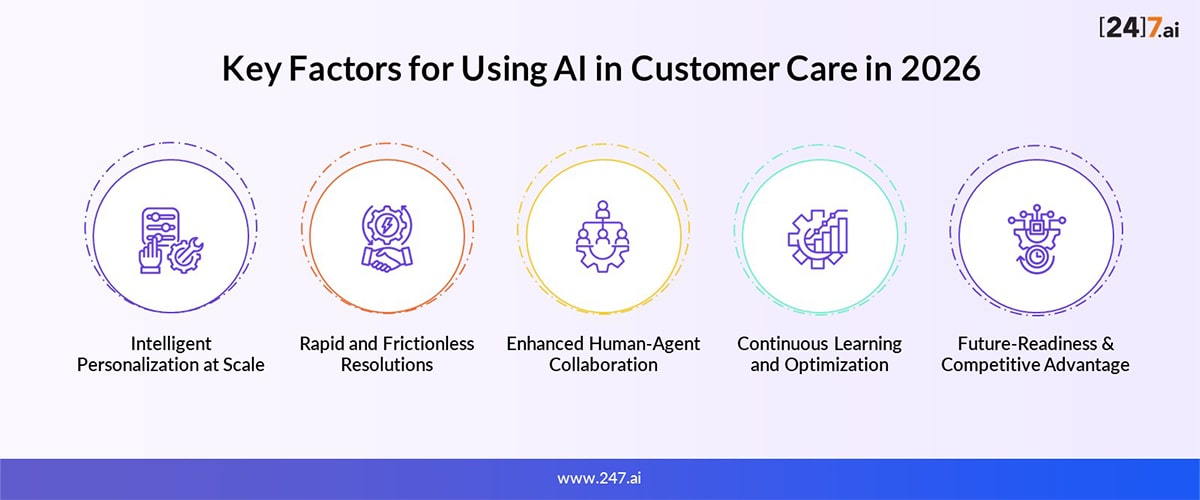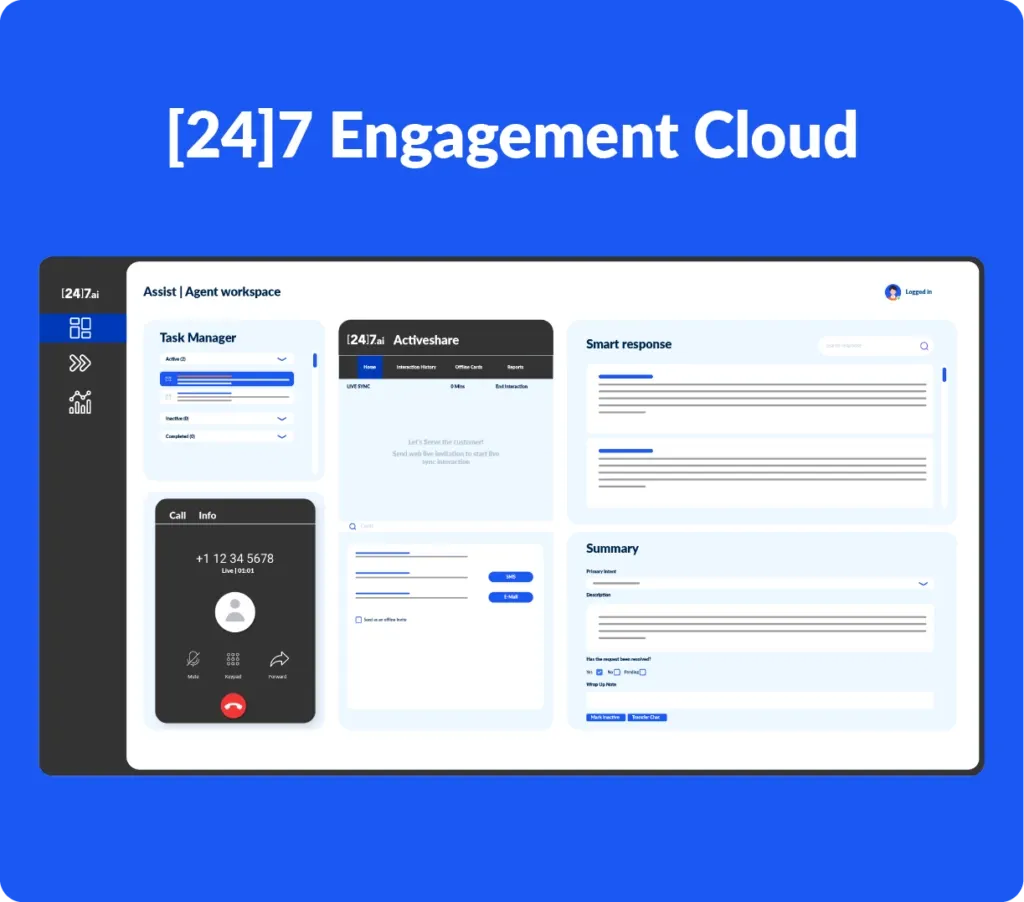Customer service is changing faster than we have ever experienced, and a significant part of this momentum is driven by technology and consumer expectations. As we hurriedly approach 2026, organizations now find themselves at a pivotal junction of the digital transformation path: it is no longer about performance, but about escaping viability. Customers expect instantaneous, unique, and seamless experiences at every digital touchpoint, which creates overwhelming pressure for organizations to rethink their entire approach to customer support.
Within this context, there is one question that needs asking, and that is: why is AI integral to the future of customer support? The answer to this question is about more than efficiency or cost savings; it is about a mindset shift when it comes to creating value interactions instead of intelligent interactions that create customer affinity and drive revenue.

The New Standard for Customer Care in 2026
In 2026, customer engagement will be more transformative than anything we have seen to date. Omnichannel support has moved from nice-to-have to must-have, with the consumer expecting a consistent, on-brand experience across engagement channels, be it chat, voice, social, or emerging engagement platforms. Hyper-personalization is setting a new standard; businesses can no longer send generic responses but need to tailor contact to the specific customer’s needs, preferences, and history.
Above all else, business hours are irrelevant as consumers are expecting to engage in an always on manner; which 83% of consumers have indicated they prefer to engage with brands providing 24×7 support options, as well as resolution of their complaints. The always-on expectation imposes a greater operational burden on the traditional customer service model as they have never functioned in an operationally-efficient way.
More so than ever, there is pressure on brands to deliver faster, smarter, and contextual experiences. And businesses that do not meet the high standards set by modern engagement will risk losing customers to competitors that can offer better digital experiences. Studies demonstrate that businesses operating AI-enabled customer care programs see customer satisfaction scores increase by almost 40% and service costs decrease by 35%.
The Evolving Power of AI in CX
The AI revolution in customer experience has really progressed beyond the rudimentary chatbots of yesterday. Today’s AI systems are using state-of-the-art generative AI capabilities, advanced natural language understanding to evolve and engage in intelligent interactions based on context and emotion, while providing nuanced responses that feel human, whilst delivering the scalability and efficiency that only technology can provide.
Modern AI has progressed and matured from a rule-based world to aligned, insight driven virtual agents, improving and learning after every interaction. These systems have the ability to manage complex queries, navigate emotional conversations, and if required, escalate out, whilst still keeping the customer context flowing with all of their journey.
[24]7.ai has emerged as a leader in this space, with award-winning solutions having actual impact in the world, across industries. [24]7.ai has mastered the art of appropriating leading edge AI technologies with human-centered design principles for achieving measurable improvements in customer satisfaction, operational efficiencies or business outcomes that redefine the meaning of AI-based customer care.

5 Key Factors for Using AI in Customer Care in 2026
1. Intelligent Personalization at Scale
The future of customer care lies in delivering truly personalized experiences to every customer, regardless of volume. AI enables organizations to tailor interactions based on comprehensive customer profiles that incorporate demographics, behavioral patterns, purchase history, and real-time context. This level of personalization was previously impossible at scale but is now achievable through advanced AI systems.
[24]7.ai Target exemplifies this capability, demonstrating how AI can personalize campaigns and interactions across multiple channels while optimizing for each platform’s unique features and user behaviors. This approach ensures that customers receive relevant, contextual support that feels individually crafted, even when automated.
Companies that equip their agents with AI copilots will deliver faster, smarter, and more compassionate service.
2. Rapid and Frictionless Resolutions
Speed and efficiency remain critical factors in customer satisfaction, but AI takes these concepts to new levels. Modern AI systems can instantly analyze customer queries, access relevant information from multiple systems, and provide accurate solutions in seconds rather than minutes or hours. This capability dramatically reduces wait times and increases first-contact resolution rates.
Real-world implementations showcase impressive results, with some telecom clients experiencing a decrease in transfer rates and significantly improved resolve rates. These outcomes demonstrate AI’s ability to handle complex queries independently while ensuring customers receive quick, accurate assistance.
3. Enhanced Human-Agent Collaboration
Rather than replacing human agents, the most effective AI implementations augment human capabilities through intelligent collaboration. AI provides agents with real-time insights, suggested responses, and contextual information that enables them to deliver superior service. This support reduces onboarding time for new agents and boosts productivity across the entire team.
Generative AI plays a particularly important role in agent training and development, providing personalized coaching and skill development opportunities. [24]7.ai’s leadership in this area, including their collaborative events with Forrester, demonstrates how AI can transform agent capabilities and job satisfaction while improving customer outcomes.
4. Continuous Learning and Optimization
One of AI’s most powerful attributes is its ability to learn and improve continuously. Every customer interaction provides valuable data that helps refine responses, optimize outcomes, and identify new opportunities for improvement. This continuous learning cycle ensures that AI systems become more effective over time, delivering increasingly better results.
Organizations using AI platforms report measurable improvements in satisfaction scores and revenue generation, demonstrating the tangible business impact of this continuous optimization approach. The ability to learn from patterns, identify trends, and adapt strategies in real-time gives AI-powered systems a significant advantage over static traditional approaches.
5. Future-Readiness & Competitive Advantage
Perhaps most importantly, AI provides organizations with the flexibility and adaptability needed to thrive in an uncertain future. As new communication channels emerge, regulations change, and customer expectations evolve, AI systems can quickly adapt without requiring complete system overhauls.
[24]7.ai’s Engagement Cloud set new industry standards by providing comprehensive, scalable solutions that can evolve with changing business needs. Their award-winning approach demonstrates how AI can provide both immediate benefits and long-term competitive advantages.

Overcoming the Hesitations - AI with a Human Touch
The modern customer increasingly prefers solving problems independently. In fact, research shows that close to 70% of customers attempt self-service before seeking help. By 2026, AI-powered self-service platforms such as smart FAQs, interactive chatbots, and advanced knowledge bases will be standard.
AI solutions do not hurt the human element, they complement it. Today, AI solutions complete simple tasks and allow intelligent support so a human agent can address the more complex, empathetic or creative aspects of their customer-care role where their “human” touch can provide most value.
Conclusion
Adopting AI for customer care in 2026 isn’t just about keeping up with technology trends; it’s about relevance in an increasingly fast-moving world with elevated customer expectations. Organizations that leverage AI-based customer care can see significant efficiencies, satisfaction, and competitive positioning while laying the groundwork for the future.
The question isn’t if organizations will harness AI for customer care, but how quickly they can intentionally leverage these powerful technologies to re-envision their customer experience. Leaders are built by purposeful action today, while laggards will fall behind the competition that recognizes the transformational potential of AI.
Ready to deliver award-winning customer experiences in 2026?
Explore how [24]7.ai’s AI-driven CX platform can transform your customer care. Visit [24]7.ai to learn more, see success stories, or schedule a personalized demo today.
Frequently Asked Questions
Yes. Modern AI platforms comply with global data privacy regulations (like GDPR and CCPA) and use encryption to safeguard customer information.
Absolutely. Cloud-based AI solutions now offer flexible pricing models, making them accessible even to startups and SMBs.
Surveys show most customers are comfortable with AI for quick resolutions, as long as there’s a smooth handoff to a human when needed.
Banking, telecom, retail, and healthcare lead adoption, but any sector with high customer interaction can benefit.
It all Depends on the complexity, the deployment can take weeks for simple chatbots to a few months for enterprise-grade integrations.



